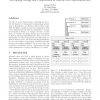Free Online Productivity Tools
i2Speak
i2Symbol
i2OCR
iTex2Img
iWeb2Print
iWeb2Shot
i2Type
iPdf2Split
iPdf2Merge
i2Bopomofo
i2Arabic
i2Style
i2Image
i2PDF
iLatex2Rtf
Sci2ools
108
click to vote
SIGOPS
2010
2010
Decoupling storage and computation in Hadoop with SuperDataNodes
The rise of ad-hoc data-intensive computing has led to the development of data-parallel programming systems such as Map/Reduce and Hadoop, which achieve scalability by tightly coupling storage and computation. This can be limiting when the ratio of computation to storage is not known in advance, or changes over time. In this work, we examine decoupling storage and computation in Hadoop through SuperDataNodes, which are servers that contain an order of magnitude more disks than traditional Hadoop nodes. We found that SuperDataNodes are not only capable of supporting workloads with high storage-to-processing workloads, but in some cases can outperform traditional Hadoop deployments through better management of a large centralized pool of disks.
| Added | 30 Jan 2011 |
| Updated | 30 Jan 2011 |
| Type | Journal |
| Year | 2010 |
| Where | SIGOPS |
| Authors | George Porter |
Comments (0)

